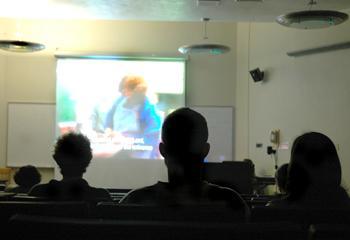Israeli filmmaker Shosh Shlam screened her documentary titled “Be Fruitful and Multiply,” a film chronicling the expectations of women in the Ultra-Orthodox Jewish culture to bare children. The Women’s and Gender Studies Program, Hillel at LSU, the Consulate General of Israel to the Southwest, International Studies and the Sociology Department collaborated for the event. The documentary focused on four women who grew up in large families in New York and Israel and were expected by their peers to carry on this legacy. Women in this culture have an average of 10 children. “I wanted to open the door to a world that is so close yet so far away,” Shlam said. One woman in the documentary, who had 16 children, said having many children was a “natural state of being” for her because she spent more than 26 years of her life either pregnant or nursing. Shlam said the documentary was controversial because one woman decided to speak out against the conventional expectations of women in the culture. The outspoken woman, who had four children, said other women in her culture feel pressured to have more children as a sign of status. “For a woman to express herself in this way was a miracle,” Shlam said. The woman’s husband did not know about her participation in the documentary until after it was televised in Israel. The woman wanted to participate in the documentary because her friend committed suicide after having her tenth child. “It’s very important to spread the message for this woman, and I hope she will succeed,” Shlam said. Jerod Brackin, computer science junior and Hillel vice president, said he was surprised Shlam found a woman who was willing to discuss an opinion that differed from the culture’s mainstream view. “It was amazing that she managed to get film time with these women,” he said. Moshe Cohen, mathematics graduate student and Hillel interim program coordinator, said he was happy to see one member of the culture standing up for the experience she went through. Shlam said it was difficult to convince the people in the culture to participate in the documentary. “You have to understand, these people will not open their door to someone not in their community,” she said. “They’re very suspicious. They’re afraid that you’ll manipulate them.” Cohen said he knows people in closed communities that resemble the one portrayed in the documentary. “I have Christian friends who are in communities that are closed similar to that but to a lesser degree, and I found it hard to engage with them outside of school,” he said. Shlam said she received opposition about the documentary from several members of the Ultra-Orthodox Jewish culture. “I got phone calls [saying], ‘How dare you do this?'” she said. But she said a modern Orthodox synagogue in New York plans to screen the documentary in December.
—–Contact Angelle Barbazon at abarbazon@lsureveille.com
Filmmaker screens Jewish culture movie
December 1, 2006

Students watch “Be Fruitful and Multiply” by Israeli filmmaker Shosh Shlam in Howe-Russell on Thursday night. The



